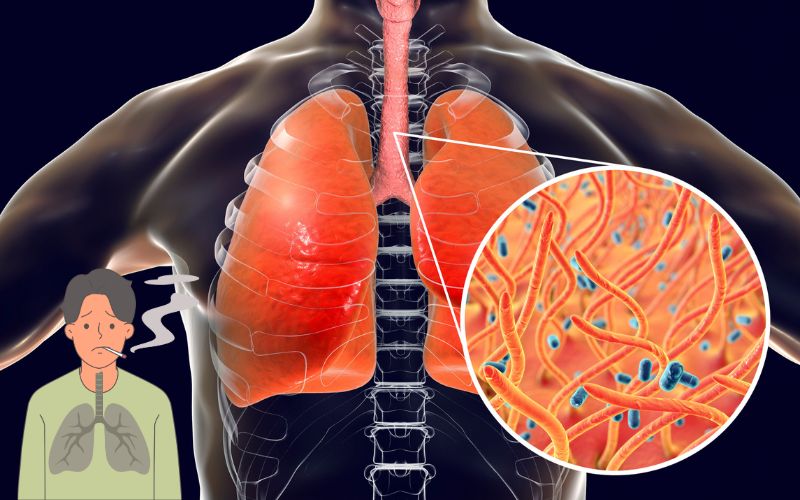The mucus in the lungs is a substance produced by the respiratory system. They protect airways from dust, allergens, and pathogens. However, when excessive mucus is produced, it can cause lung diseases. Removing mucus from the lungs can be uncomfortable for people dealing with conditions like asthma, bronchitis, or COPD. It makes breathing difficult and creates a congested feeling in the chest. Many patients seek natural ways to clear mucus from their lungs to avoid side effects from medications. Read this blog until the end to learn the causes of mucus buildup and how to remove mucus from lungs naturally.
9 Natural Ways to Clear Mucus from the Lungs
Respiratory issues are common, with studies showing that chronic cough affects around 2.5% of the population nationwide. Many natural remedies can help ease mucus congestion and prevent lung disease. Here are some of them:
- Steam Therapy
Steam therapy works by loosening the mucus, making it easier to expel. The moist airways help reduce the thickness of the mucus in the lungs.
- Boil water and pour it into a bowl.
- Lean over the bowl, cover your head with a towel, and inhale the steam for 5-10 minutes.
- Repeat this twice a day to help loosen mucus in the lungs.
Add a few drops of eucalyptus oil to the water for added decongestant properties.
- Stay Hydrated
Drinking a moderate amount of fluids, like water and others, can help in thinning the mucus to allow easier removal via cough. The best is to drink water, and if you want, warm liquids such as infusions or honey with lemon.
- Hydration keeps the mucus thin, so it’s easier to remove.
- Warm liquids soothe the throat and chest, easing breathing.
- Consume Mucus-Clearing Foods
Many foods naturally help reduce phlegm and make it easier to remove them. A few examples include:
- Ginger: Ginger’s anti-inflammatory properties help reduce mucus in the lungs.
- Turmeric: Turmeric contains curcumin, which has anti-inflammatory and antioxidant effects. Drinking turmeric milk (haldi doodh) can soothe mucus buildup.
- Pepper: Black pepper (gol mirch) contains piperine, which helps break down mucus.
- Garlic: Garlic acts as a natural antibiotic, helping to prevent infections that cause mucus buildup.
- Honey: Honey’s soothing properties help thin mucus and clear the respiratory tract.
- Herbal Remedies
Herbal remedies can remove phlegm from the lungs. Here are a few herbal teas that may help:
- Pudina Chai: Menthol in pudina acts as a natural decongestant and breaks down mucus.
- Ajwain Chai: Ajwain’s antibacterial properties aid in thinning mucus in the airways.
- Mulethi Chai: This herbal remedy reduces inflammation.
- Use a Humidifier
Using a humidifier keeps the air moist, helping to reduce mucus production. Dry air can irritate the lungs and create more mucus. Keeping the air moist can relieve the respiratory tract and make it easier to remove phlegm.
- Deep Breathing Exercises
Deep breathing exercises increase lung capacity and improve oxygen flow, helping to loosen mucus.
- Sit comfortably and take a deep breath through your nose.
- Hold your breath for 2-3 seconds, then slowly exhale through your mouth.
- Repeat for 10 minutes, 2-3 times a day.
- Physical Activity
Regular physical activity helps remove mucus from the lungs. Activities like deep breathing, controlled coughing, and specific respiratory physiotherapy exercises can mobilise mucus. Techniques such as the “screw” movement and diaphragm exercises stretch the chest & improve airflow helps in the removal of mucus.
- Saltwater Gargle
Gargling with salt water clears mucus from the throat and lungs. It kills bacteria and relieves an irritated throat, making it easier to cough up phlegm.
- Mix half teaspoon of salt in a glass of warm water.
- Gargle for 30 seconds and spit it out.
- Postural Drainage
Postural drainage uses gravity to help drain mucus from the lungs. Specific positions allow mucus to drain into the throat, making it easier to remove.
- Lie on your back or stomach with your hips elevated using pillows.
- Stay in this position for 10-15 minutes, allowing gravity to do its work.
- Sit up afterwards and try to cough out the loosened mucus.
Causes of Mucus Production
Excessive mucus in the lungs often points to underlying health conditions. Some common causes include:
- Infections: Illnesses like colds, flu, bronchitis, and pneumonia cause the body to increase mucus production as it fights off germs.
- Allergies: In sensitive individuals, allergens can cause inflammation and trigger excess mucus production. Like you may experience sneezing problem.
- Smoking: Tobacco smoke irritates the lungs and leads to overproduction of mucus.
- Chronic Conditions: Diseases like chronic obstructive pulmonary disease (COPD), cystic fibrosis, and bronchiectasis are linked to continuous mucus build-up.
- Gastroesophageal Reflux Disease (GERD): Acid reflux irritates the throat and causes postnasal drip, leading to mucus build-up in the lungs.
When Should You See a Lung Specialist in Delhi
If natural remedies aren’t providing relief or you’re experiencing persistent mucus, consult a lung specialist in Delhi. Conditions like bronchitis, COPD, or asthma might require medical intervention. Delhi has many reputable clinics and hospitals, like Doctor’s Hub, where lung specialists can provide treatment.
If you are also dealing with digestive issues, visit a Gastroenterologist in Delhi for advise. A Gastro specialist can help manage digestive conditions that may increase mucus production.
A large amount of mucus can mean severe conditions such as chronic obstructive pulmonary disease (COPD) or infections, making breathing difficult and increasing infection risk. Natural remedies can offer relief, but it is best to consult a lung doctor if symptoms persist. Some issues related to mucus may also be because of problems with nose, for that it is suggested to meet ENT treatment specialist.
If you are someone that stays in Delhi, lung specialists and gastroenterologists at Doctor’s Hub can recommend treatment for frequent lung or digestive issues.














1 Comment
Feeling Common Cold with Cough? Consult a Doctor in Delhi now
[…] for Cough Relief: Honey has natural soothing properties. A teaspoon of honey before bed may reduce coughing and help […]